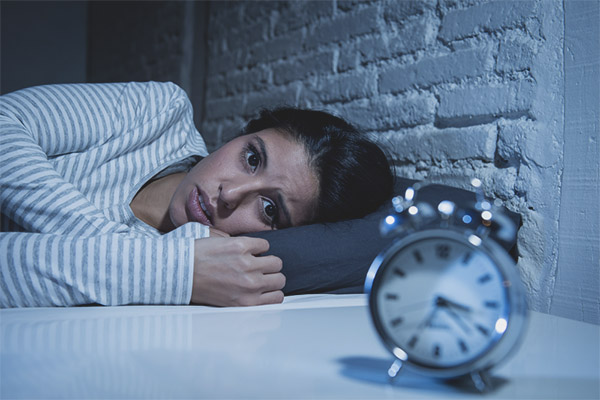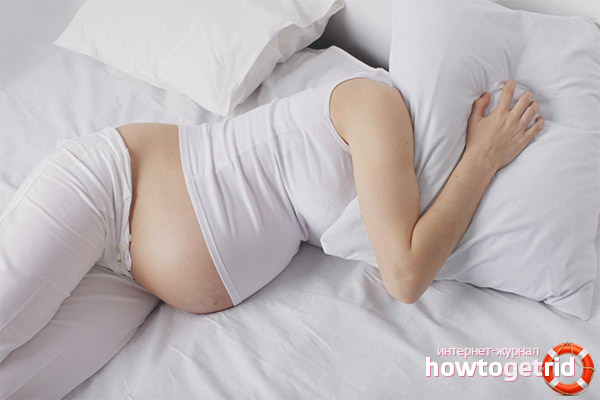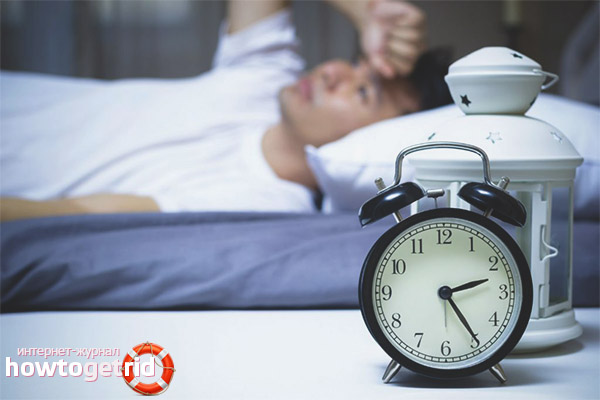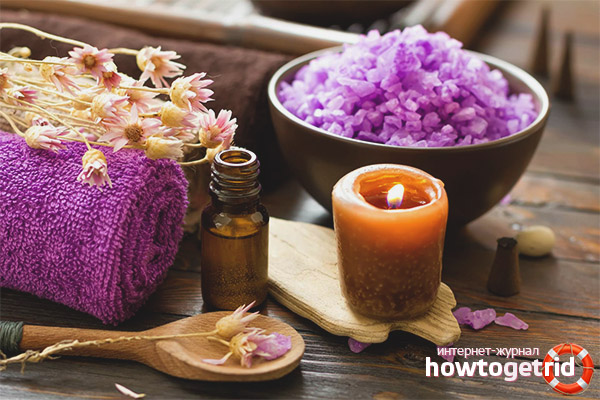The content of the article
Violation of the duration and quality of sleep has a negative impact on human health, making it difficult to plan the mode of work and rest. Insomnia is not selective - it can overtake both an adult and a child of different gender, regardless of region of residence and standard of living. However, according to statistics, women are more often exposed to it (heightened emotionality), and also people of old age (hormonal and other age-related changes).
Of course, it does not arise for no reason and always has consequences. Therefore, if you cannot fall asleep quickly or sleep becomes restless, it is necessary to determine the causes of the nervous system disorder and begin effective treatment.
Causes of Insomnia
A violation is considered the absence of a full sleep more than 2 times a week, which is observed for a month or longer.
Insomnia can occur for a variety of reasons, both endogenous (disturbances in the body) and exogenous (external factors).
Among the exogenous factors, the most common are:
- Bad habits. It is known that smoking, and alcoholism, and taking narcotic drugs inhibits the nervous system. Long-term use of sedative drugs, tranquilizers and sleeping pills suppresses the ability of the central nervous system to independently regulate wakefulness and rest. Thus, as a result of long-term treatment, the brain becomes accustomed to help “from the outside” and cannot independently slow down the work of the internal systems, as a result of which the body is in a state of arousal.
- Schedule irregularities. Biological clocks predetermine effective sleep from 22:00 to 00:00, not later. Fans of nightlife violate biorhythms, with the result that sleep can only come in the morning and at completely different hours. In this case, there is a tendency to shift the upper limit, and the person falls asleep every time later and later.
- Diet Oddly enough, the quality and duration of sleep is affected by the type of food and drink consumed, as well as dinner time and the size of meals.For a comfortable sleep, you should eliminate the habit of tightly filling the stomach, because the body instead of rest begins to actively and actively digest food, especially when it comes to long digestible foods (meat, by-products, dairy and dairy foods, slow carbohydrates). Nutritionists do not recommend eating spicy, fatty and sweet foods before bedtime. It is strictly forbidden to drink caffeine-containing drinks, energy drinks and strong tea shortly before the rest.
- Hypodynamia. The lack of sufficient stress (sports, walking, active work, etc.) cause fatigue of the central nervous system, resulting in falling asleep takes longer, and sleep becomes nervous and tender.
- Lack of fresh air. Prolonged stay at home or in a non-ventilated room causes oxygen starvation of the brain, which leads to disruption of its work.
- Physical discomfort. Sometimes sleep is hindered by the environment in which you fall asleep. Many people are completely unable to fall asleep at a party or in transport. An uncomfortable bed or bedding, unusual smells, sounds or lighting in the room, too high or low temperatures, etc. can knock out the ruts.
Endogenous causes are of a mental or physiological nature:
Mental disorders (panic and anxious thoughts, chronic stress, depression, mental stress, etc.) lead to over-stimulation of the nervous system, making the brain more difficult to calm it down at a time when it is time to go to bed. If falling asleep happens, the person complains of sudden waking ups, restless sleep with nightmares, a feeling of being bruised the next day, etc.
Physiological causes may be associated with various diseases, pathologies and hidden processes in the body. Frequent insomnia primarily indicates:
- neurological disorders;
- diseases of the cardiovascular system;
- endocrine system diseases (in particular, the thyroid gland);
- diseases of the digestive tract, which affects the speed and quality of assimilation of food;
- traumatic brain injury or recent surgery;
- chronic pain;
- hidden forms of various diseases.
Insomnia in pregnant women
Separately, we should consider the causes of illness in future mothers, as they are associated with a complete restructuring of the internal organs and systems.
- Hormonal changes. First of all, sleep disorders are associated with increased production of the hormone of pregnancy - progesterone. It produces the effect of an antidepressant, with the result that the future mother constantly tends to sleep. However, already in the second trimester, the placenta and ovaries begin to produce large amounts of the hormone, resulting in insomnia and other sleep disorders. In the third trimester (week 35-39), before birth, a sharp decrease in progesterone production is observed, which again causes insomnia in the expectant mother.
- Physiological factors. It is known that in the early stages of growth of the uterus and other changes in the body lead to a number of unpleasant symptoms: heartburn, nausea and vomiting, indigestion, frequent urination, apnea during sleep (apnea), chronic pain, etc., prevent sleep from falling during the second trimester, fetal movement, uncomfortable posture, aching back pain, large abdomen, etc. may occur. In the later periods, swelling and cramping of the limbs, stretching of the skin, which is accompanied by itching, are added to the indicated signs. A couple of weeks before childbirth, “training contractions” may also occur, which are characterized by uterine tone (the stomach is turning to stone). All these symptoms impede timely and high-quality sleep in pregnant women.
- Psychological causes. The longer the gestational age becomes, the more disturbing thoughts the woman overcomes. She is worried about the physical development and health of the baby, because of the shaky hormonal background, she takes domestic troubles to her heart, worries about the upcoming birth and a radical change in lifestyle. That is why in the first and third trimester, the future mother is often tormented by insomnia.
Complications and consequences
Prolonged disturbance of sleep, duration and quality of sleep causes a number of serious consequences for human health.
- From the nervous system there are convulsions, numbness of the extremities, tremor, psychosis, depression, increased aggressiveness and irritability, panic attacks. Labor productivity and concentration are falling, memory is disturbed, severe weakness and rapid fatigue are noted. Also, an uninspirated person often suffers from headaches, migraines.
- Physical indicators are deteriorating: the area of muscle tissue, strength characteristics, etc., decreases.
- There is a risk of cardiovascular abnormalities: infarction of internal organs, stroke, failure, thrombosis,vascular dystonia, hypertensive states. Many people complain of palpitations, rhythm changes.
- Digestion is impaired. The lack of proper rest leads to chronic constipation or diarrhea, the appearance of heartburn, increased acidity of the stomach, impaired bile production, etc. Insomnia also leads to morning sickness and lack of appetite, resulting in a person skipping an important breakfast for the body.
- General and local immunity falls, against the background of which chronic diseases and allergic reactions are exacerbated, and viral and infectious diseases often occur.
How to overcome insomnia
The somnologist, first of all, will offer the patient to establish his own sleep without the involvement of medical procedures and chemical preparations.
For a good and fast sleep 2 hours before bedtime, you need:
- Limit physical activity, avoid loads, weight lifting, movement.
- Refuse to watch movies that lead to nervous excitability (for example, horrors and action movies).
- Postpone the decision of important working moments, domestic issues.
- Do not eat heavy food (fried, fatty, sweet, spicy, as well as meat dishes and canned food).
- Do not drink coffee, strong tea, energy, toning herbal teas (ginseng, ginger, etc.).
- Do not drink large amounts of fluid (crowded bladder and the frequent urge to empty do not contribute to a comfortable sleep and prolonged sleep).
For complex treatment of insomnia with a permanent effect, you must observe the following rules:
- Stay awake and sleep. Try to go to bed every day at the same time (preferably not later than 11 o'clock in the evening). It can take several weeks to develop this habit. Sleep should be full, deep, be at least 8-9 hours. It is also desirable to abandon the daytime sleep.
- Adjust the power. Dinner should always be easily digestible, be made 3-4 hours before bedtime. The menu may include sea lean fish and seafood, rice or buckwheat, fermented milk non-fat foods, vegetables of any kind, fruits.
- Before bedtime, do not use strong teas (especially green), give up coffee, hot chocolate, cocoa. It is also undesirable to use chocolates, other sweets.
- Start taking vitamins.Trace elements (eg, magnesium) and B vitamins reduce anxiety and excitability of the central nervous system, favoring rapid sleep. If, against the background of a sleep disorder, weakness, weakness and frequent colds are observed, then start taking ascorbic and folic acid within a month.
- Sign up for a sport. Adequate exercise will help temper the immune system, relieve the nervous system, improve digestion and lose weight, which in the complex will contribute to a good sleep. It is important that classes are regular (at least 2-3 times a week). Very good daily exercise for 20-30 minutes. Yoga is ideal for relaxation and general strengthening.
- In case of chronic heartburn, fall asleep on a high pillow.
- Ensure optimal sleeping conditions in the bedroom: comfortable temperature and humidity, silence, darkness. Choose an orthopedic mattress and pillow, bedding pleasant to the body (preferably from natural materials). Remove annoying factors like flashing while charging the phone, ticking hours, dripping faucet, etc.
- Before bedtime, it is desirable to air the room for 10-15 minutes.Oxygen normalizes metabolism, provides the respiratory function of cells.
- Find the best ways to relax. Often, insomnia is associated with anxiety, solving tasks, anxiety about events, etc. There are various ways to help calm the nervous system, relieve physical tension. A good effect is demonstrated by an evening yoga complex and special breathing exercises. A common stress will relieve a hot bath with sea salt and essential oils. Place a bag of dry lavender grass in the area of the pillow. Also, before going to bed, you can watch a good movie or a children's cartoon, read a book, mate, and take up a quiet hobby with classical music. The most important thing is not to have exciting conversations and not to finish working projects.
Folk recipes for insomnia
Many centuries ago, ancestors began to use natural ingredients to improve the quality and duration of sleep. In the course of many years of experiments, the most effective and absolutely safe for insomnia recipes were created.
Honey mixture
It is known that bee products, such as honey, pollen, royal jelly, propolis, etc. soothe the nervous system and produce a mild sedative effect.
Quick recipe - combine a glass of warm water or milk with a tablespoon of honey and drink in one gulp half an hour before bedtime.
You can also mix crushed lemon with zest (1 pc.), 2 large spoons of real honey and crushed walnuts. The resulting mixture should be taken in a volume of 1 tablespoon 30 minutes before bedtime.
Effectively a combination of honey and apple vinegar. To do this, 100 g of bee product is ground with 3 teaspoons of vinegar, and then the mixture is sent to the cold for several days. The present honey paste is taken in a volume of 1-2 teaspoons 30 minutes before bedtime.
Aromatherapy
Pairs of essential oils act on the body in a complex way: they release tension in the central nervous system, relax muscles, eliminate headaches, and produce mild sedation. However, not all oils are favorable for the treatment of insomnia. Essential oils of mint, rosemary, sandalwood, lavender, jasmine, valerian, basil, cedar and rosewood reduce the excitability of the nervous system.
For treatment, it is enough to drip 4-5 drops into the bowl of the oil burner and smoke oil in the room to sleep for 30 minutes. You can also moisten with ether a corner of bed linen or a napkin, then put it in the head area.
A good effect is demonstrated by warm evening baths with the specified oils. At least 10-15 drops are added to the water, after which the procedure lasts about 15 minutes.
You can massage with essential oils, which will also make it easier to fall asleep. It is necessary to massage the temples, palms, feet, neck and shoulder area.
Phytotherapy
Traditional medicine encourages the use of plant fees for the treatment of insomnia at home. There are a significant number of recipes - everyone will definitely find an effective combination of herbs for themselves.
For example, the following herbal preparations produce a good effect:
- a tablespoon of oregano, a teaspoon of ground valerian root and 120 ml of boiling water;
- a tablespoon of motherwort, the same amount of valerian root, a teaspoon of lemon balm and a glass of boiled water;
- on a small spoon of calendula, motherwort, thyme and half a liter of boiling water;
- a tablespoon of sleep-herbs and a glass of boiling water;
- a teaspoon of sage, lavender, mint and half a liter of boiling water;
- Peony tincture (30 drops three times a day for a couple of weeks).
These dry fees are prepared in the form of a decoction. You can boil the mixture in a water bath for about 15 minutes, then strain and drink before bedtime (no more than a glass). You can also steam in a thermos and dilute with water 1 to 1 (drink at night in the volume of a glass).
All the above methods should be applied in combination. If treatment does not make it easier to fall asleep for 10 or more days, then make an appointment with a somnologist, who deals with insomnia and biorhythm disorders. The specialist will identify the causes of slow falling asleep and prescribe an individual course of therapy. If there is no such highly specialized doctor in your region, then a neurologist will help to cope with the problem of falling asleep.
Video: 13 ways to quickly fall asleep














To send